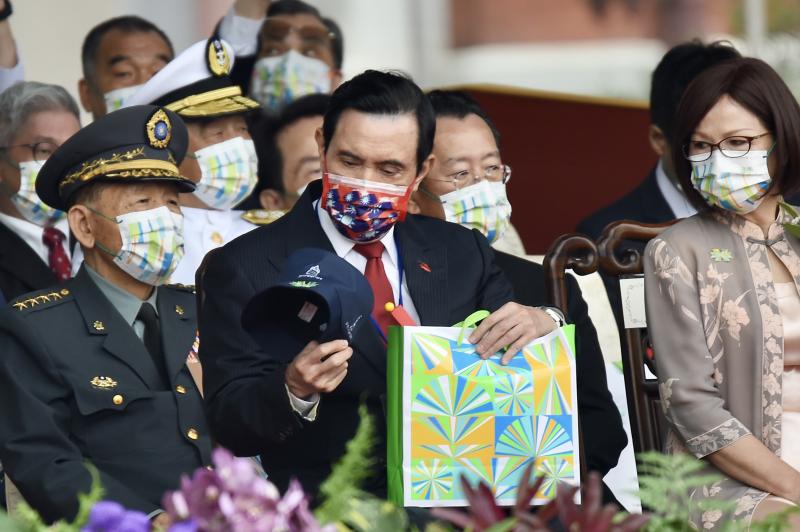Former president Ma Ying-jeou (馬英九) on Monday said he would not attend the official Double Ten National Day celebrations for the first time this year, as its English name, “Taiwan National Day,” implies “Taiwan independence.”
Writing on Facebook, Ma said he has attended every National Day celebration since entering public service 40 years ago, but “with an exceedingly heavy heart,” has decided to reject this year’s invitation.
For the past three years, the government under President Tsai Ing-wen (蔡英文) has used “Taiwan National Day” for the event’s official English-language title, leaving the “Republic of China” nowhere to be found, he said.

Photo: Tu Chien-jung, Taipei Times
The move also goes against the Constitution and endangers security in the Taiwan Strait, he added, calling it “extremely detrimental and irresponsible.”
Continuing to attend the Oct. 10 celebration under these circumstances would “in a roundabout, furtive way be an endorsement of ‘Taiwan independence,’” Ma said, urging voters to remove the current government in January.
New Taipei City Mayor Hou You-yi (侯友宜), the Chinese Nationalist Party (KMT) presidential candidate, in the comments echoed Ma’s protest.
“Our country is the Republic of China and cannot be deliberately forgotten — even erased — by the Democratic Progressive Party government,” he wrote. “There must be a transition of power in 2024.”
Speaking to reporters on the sidelines of an event in Taipei, Premier Chen Chien-jen (陳建仁) said he does not understand why Ma has chosen this year to boycott the event, after attending under the same circumstances in previous years.
“National Day is a day for the nation to move forward together,” he said. “Hopefully everyone may unite in celebration and together defend the sovereignty, freedom and democracy of the Republic of China (Taiwan).”

Taiwan is stepping up plans to create self-sufficient supply chains for combat drones and increase foreign orders from the US to counter China’s numerical superiority, a defense official said on Saturday. Commenting on condition of anonymity, the official said the nation’s armed forces are in agreement with US Admiral Samuel Paparo’s assessment that Taiwan’s military must be prepared to turn the nation’s waters into a “hellscape” for the Chinese People’s Liberation Army (PLA). Paparo, the commander of the US Indo-Pacific Command, reiterated the concept during a Congressional hearing in Washington on Wednesday. He first coined the term in a security conference last

Prosecutors today declined to say who was questioned regarding alleged forgery on petitions to recall Democratic Progressive Party (DPP) legislators, after Chinese-language media earlier reported that members of the Chinese Nationalist Party (KMT) Youth League were brought in for questioning. The Ministry of Justice Investigation Bureau confirmed that two people had been questioned, but did not disclose any further information about the ongoing investigation. KMT Youth League members Lee Hsiao-liang (李孝亮) and Liu Szu-yin (劉思吟) — who are leading the effort to recall DPP caucus chief executive Rosalia Wu (吳思瑤) and Legislator Wu Pei-yi (吳沛憶) — both posted on Facebook saying: “I

The Ministry of Economic Affairs has fined Taobao NT$1.2 million (US$36,912) for advertisements that exceed its approved business scope, requiring the Chinese e-commerce platform to make corrections in the first half of this year or its license may be revoked. Lawmakers have called for stricter enforcement of Chinese e-commerce platforms and measures to prevent China from laundering its goods through Taiwan in response to US President Donald Trump’s heavy tariffs on China. The Legislative Yuan’s Finance Committee met today to discuss policies to prevent China from dumping goods in Taiwan, inviting government agencies to report. Democratic Progressive Party Legislator Kuo Kuo-wen (郭國文) said

The Ministry of Economic Affairs has fined Taobao NT$1.2 million (US$36,900) for advertisements that exceeded its approved business scope and ordered the Chinese e-commerce platform to make corrections in the first half of this year or its license would be revoked. Lawmakers have called for stricter supervision of Chinese e-commerce platforms and more stringent measures to prevent China from laundering its goods through Taiwan as US President Donald Trump’s administration cracks down on origin laundering. The legislature’s Finance Committee yesterday met to discuss policies to prevent China from dumping goods in Taiwan, inviting government agencies to report on the matter. Democratic Progressive Party